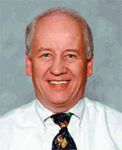Legendre honored for lifetime achievement
The struggle right now is to get quality people to stay in academics.
ORLANDO — He is an original faculty member of the University of Tennessee College of Veterinary Medicine, a charter oncology diplomate of the American College of Veterinary Internal Medicine (ACVIM), the founding editor of its journal and a trailblazer in research for blastomycosis and feline infectious peritonitis.

Dr. Alfred M. Legendre
"After reaching this point in my career, I realize that I'm fortunate to have enjoyed pretty much everything I've done," says Alfred M. Legendre, DVM, MS, Dipl. ACVIM, who was awarded the 2006 Mark L. Morris, Sr. Lifetime Achievement Award. "While academic veterinary medicine might not be the highest paid area, it's adequate to have a good quality of life, and it has a great diversity of what it offers, including involvement with teaching students, interns and residents as well as the clinical quality of veterinary medicine that is practiced and the opportunity to get into research. The younger generation needs to look long and hard at this very fulfilling, diversified career."
Legendre's varied career was bound together with his passion for advancing veterinary internal medicine. After serving a one-year term as chairman of the ACVIM board of regents in 1985, he and his wife launched the Journal of Veterinary Internal Medicine (JVIM) out of their basement because "internal medicine needed a journal of its own."
Almost 19 years later, JVIM has grown into one of the most prestigious veterinary publications for researchers, interns and residents, Legendre says.
"It's one of those things that has come a long way, and it's been fun being the starting point for that one," he says.
Legendre has been the starting point for a myriad of projects at UT, too, as a charter faculty member. He says he's proud to be part of the team that built a successful veterinary college, but academia now must tackle real pressures of retaining people that it has educated.
"The struggle right now is to get the quality people to stay in academics to go ahead and develop future specialists. That's the biggest struggle for academia," he says. "Then we need to figure out how all the generalists and specialists fit into the veterinary profession and maintain the communication between the two groups because they should all be working together to achieve the same thing."
Though Legendre is about two years away from retiring, he doesn't plan on leaving the profession any time soon. He plans to continue to teach part time in a UT professor emeritus program after his formal departure, and the breadth of his research interests likely will keep him wondering when he had time to work.
Legendre currently is working to develop a blastomycosis along with Dr. Bruce Klein, a pediatrician infectious disease specialist at the University of Wisconsin School of Medicine and Public Health.
He is also working with L. Joseph Wheat, MD, president and founding director of MiraVista Diagnostics in Indianapolis, to convert advancements in fungal disease diagnostics to the animal world.
As comparative medicine continues to expand following the decoding of the human and canine genomes, Legendre says he hopes new oncologic strategies will yield measurable results for human and animal health. UT will participate in a pilot program launched by the National Institutes of Health (NIH) to test emerging cancer therapies on naturally occurring cancers in dogs instead of transplanting tumors into mice to test new drugs.
"There is a strong body of evidence that suggests that if you take a dog with a naturally occurring tumor, and you use a new form of therapy that works in that dog, then it is much more likely to work in people, and that is certainly an area that we are interested in," he says.